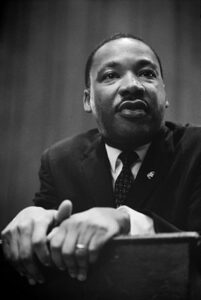
Deerfield-News.com-Deerfield Beach,Fl-From Wikipedia.org-
Martin Luther King Jr. Day (officially Birthday of Martin Luther King, Jr.,[1] and sometimes referred to as MLK Day) is an American federal holiday marking the birthday of Martin Luther King Jr. It is observed on the third Monday of January each year, which is around King’s birthday, January 15. The holiday is similar to holidays set under the Uniform Monday Holiday Act. The earliest Monday for this holiday is January 15 and the latest is January 21.
King was the chief spokesperson for nonviolent activism in the Civil Rights Movement, which successfully protested racial discrimination in federal and state law. The campaign for a federal holiday in King’s honor began soon after his assassination in 1968. President Ronald Reagan signed the holiday into law in 1983, and it was first observed three years later. At first, some states resisted observing the holiday as such, giving it alternative names or combining it with other holidays. It was officially observed in all 50 states for the first time in 2000.
The idea of Martin Luther King Jr. Day as a holiday was promoted by labor unions in contract negotiations.[2] After King’s death, U.S. Representative John Conyers (a Democrat from Michigan) and U.S. Senator Edward Brooke (a Republican from Massachusetts) introduced a bill in Congress to make King’s birthday a national holiday. The bill first came to a vote in the U.S. House of Representatives in 1979. However, it fell five votes short of the number needed for passage.[3] Two of the main arguments mentioned by opponents were that a paid holiday for federal employees would be too expensive, and that a holiday to honor a private citizen would be contrary to longstanding tradition (King had never held public office).[3] Only two other figures have national holidays in the U.S. honoring them: George Washington and Christopher Columbus.
Soon after, the King Center turned to support from the corporate community and the general public. The success of this strategy was cemented when musician Stevie Wonder released the single “Happy Birthday” to popularize the campaign in 1980 and hosted the Rally for Peace Press Conference in 1981. Six million signatures were collected for a petition to Congress to pass the law, termed by a 2006 article in The Nation as “the largest petition in favor of an issue in U.S. history.”[2]
Senators Jesse Helms and John Porter East (both North Carolina Republicans) led opposition to the holiday and questioned whether King was important enough to receive such an honor. Helms criticized King’s opposition to the Vietnam War and accused him of espousing “action-oriented Marxism“.[4] Helms led a filibuster against the bill and on October 3, 1983, submitted a 300-page document to the Senate alleging that King had associations with communists. New York Senator Daniel Patrick Moynihan declared the document a “packet of filth”, threw it on the Senate floor and stomped on it.[5][6]
President Ronald Reagan originally opposed the holiday, citing cost concerns. When asked to comment on Helms’ accusations that King was a communist, the president said “We’ll know in thirty-five years, won’t we?”, in reference to the eventual release of FBI surveillance tapes that had previously been sealed.[7] But on November 2, 1983, Reagan signed a bill, proposed by Representative Katie Hall of Indiana, to create a federal holiday honoring King.[8][9] The bill had passed the House of Representatives by a count of 338 to 90, a veto-proof margin.[4] The holiday was observed for the first time on January 20, 1986.[9] It is observed on the third Monday of January.[10]
The bill also established the Martin Luther King Jr. Federal Holiday Commission to oversee observance of the holiday, and Coretta Scott King, King’s wife, was made a member of this commission for life by President George H. W. Bush in May 1989.[11][12]
State-level passage[edit]
Although the federal holiday honoring King was signed into law in 1983 and took effect three years later, not every U.S. state chose to observe the holiday at the state level until 1991, when the New Hampshire legislature created “Civil Rights Day” and abolished “Fast Day“.[13] In 2000, Utah became the last state to name a holiday after King when “Human Rights Day” was officially changed to “Martin Luther King Jr. Day.”[14]
In 1986, Arizona Governor Bruce Babbitt, a Democrat, created a paid state MLK holiday in Arizona by executive order just before he left office, but in 1987, his Republican successor Evan Mecham, citing an attorney general’s opinion that Babbitt’s order was illegal, reversed Babbitt’s decision days after taking office.[15] Later that year, Mecham proclaimed the third Sunday in January to be “Martin Luther King Jr./Civil Rights Day” in Arizona, albeit as an unpaid holiday.[16] In 1990, Arizona voters were given the opportunity to vote on giving state employees a paid MLK holiday. That same year, the National Football League threatened to move Super Bowl XXVII, which was planned for Arizona in 1993, if the MLK holiday was voted down.[17] In the November election, the voters were offered two King Day options: Proposition 301, which replaced Columbus Day on the list of paid state holidays, and Proposition 302, which merged Lincoln’s and Washington’s birthdays into one paid holiday to make room for MLK Day. Both measures failed to pass, with only 49% of voters approving Prop 302, the more popular of the two options; although some who voted “no” on 302 voted “yes” on Prop 301.[18] Consequently, the state lost the chance to host Super Bowl XXVII, which was subsequently held at the Rose Bowl in Pasadena, California.[17] In a 1992 referendum, the voters, this time given only one option for a paid King Day, approved state-level recognition of the holiday.[19]
On May 2, 2000, South Carolina governor Jim Hodges signed a bill to make King’s birthday an official state holiday. South Carolina was the last state to recognize the day as a paid holiday for all state employees. Prior to this, employees could choose between celebrating Martin Luther King Jr. Day or one of three Confederate holidays.[20] The municipal government of Forest City, North Carolina allows employees to choose between their own birthday or Martin Luther King Jr. Day for a paid holiday.































